湖南省2017年中考英语总复习语法课件:专题3 冠词
文档属性
| 名称 | 湖南省2017年中考英语总复习语法课件:专题3 冠词 |
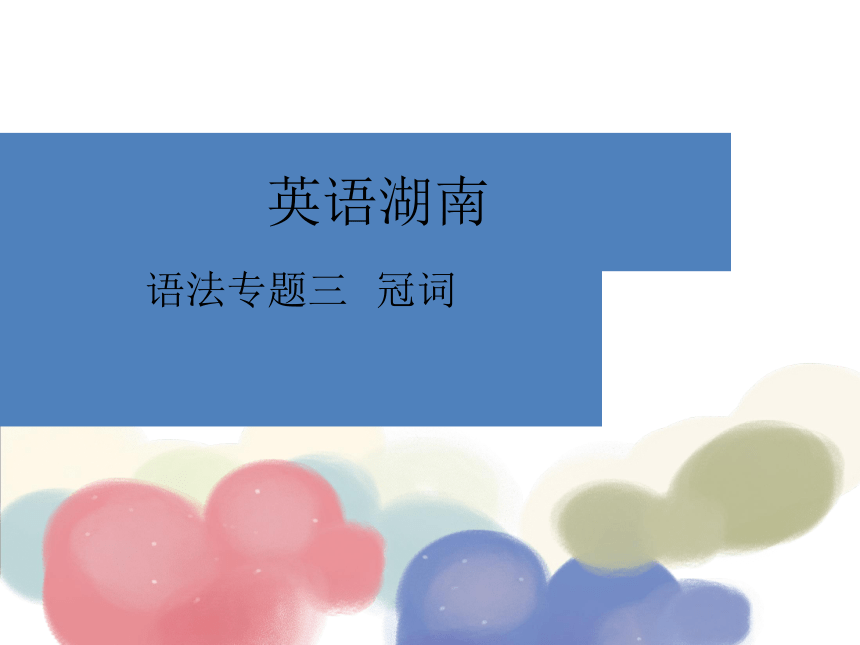
|
|
| 格式 | zip | ||
| 文件大小 | 2.1MB | ||
| 资源类型 | 教案 | ||
| 版本资源 | 通用版 | ||
| 科目 | 英语 | ||
| 更新时间 | 2017-05-26 00:00:00 | ||
图片预览

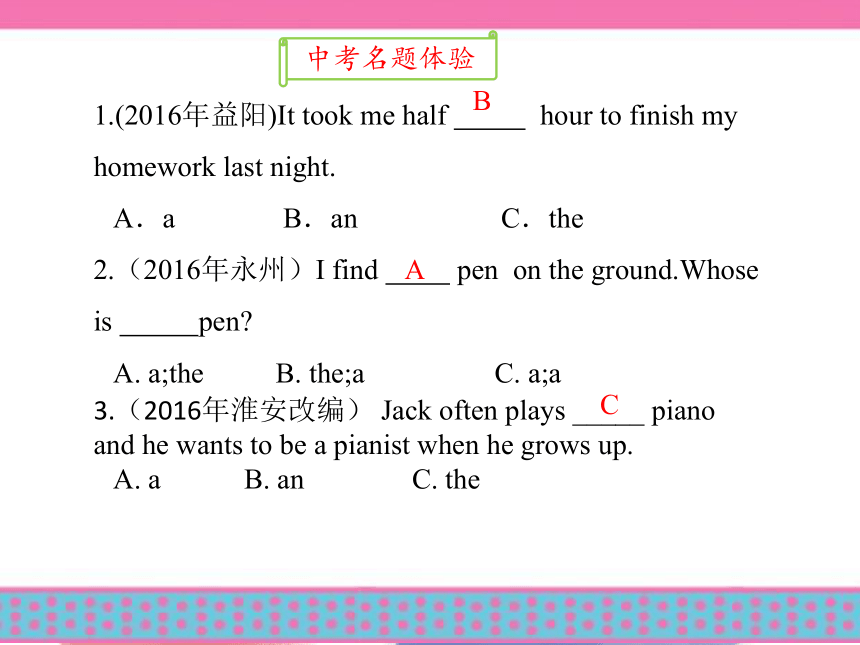
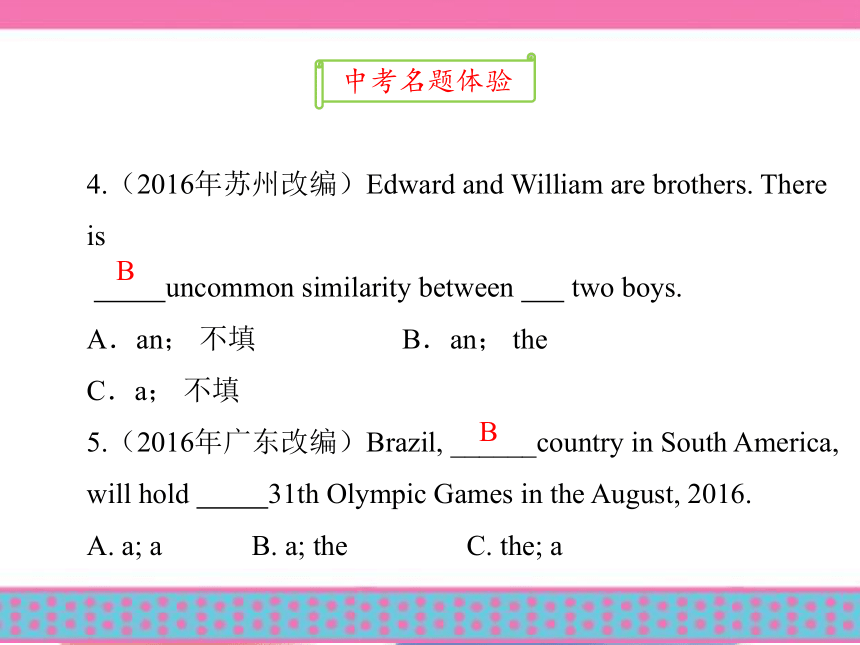
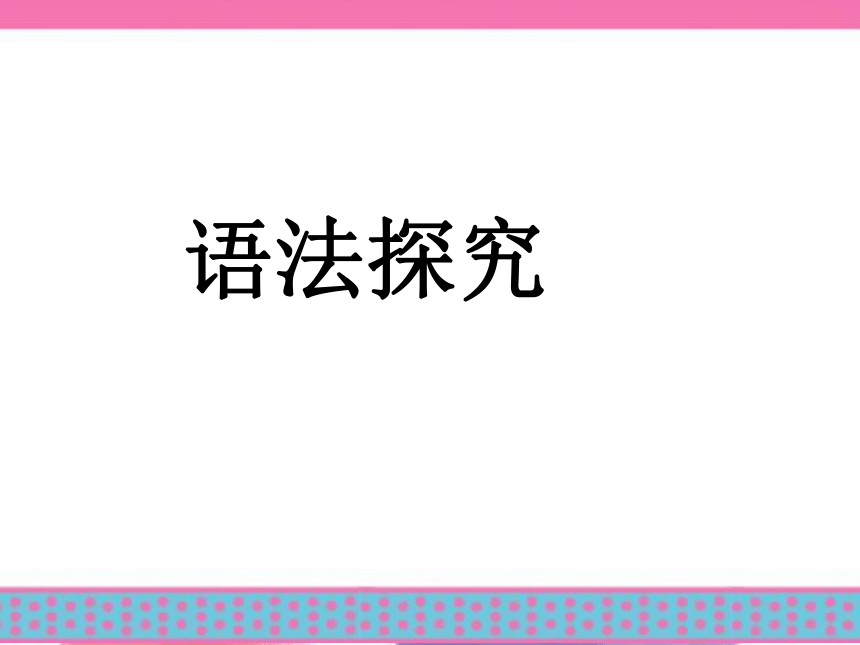
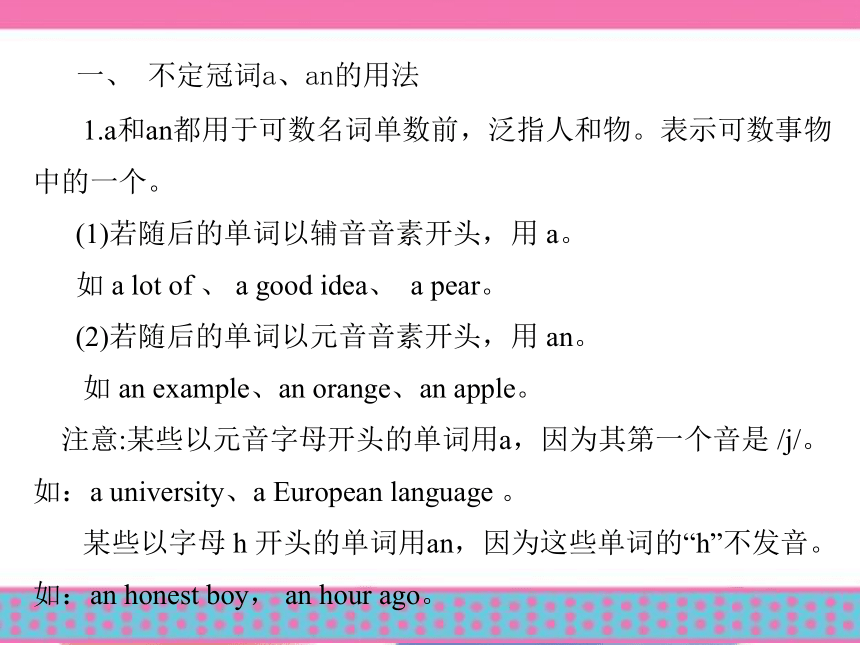

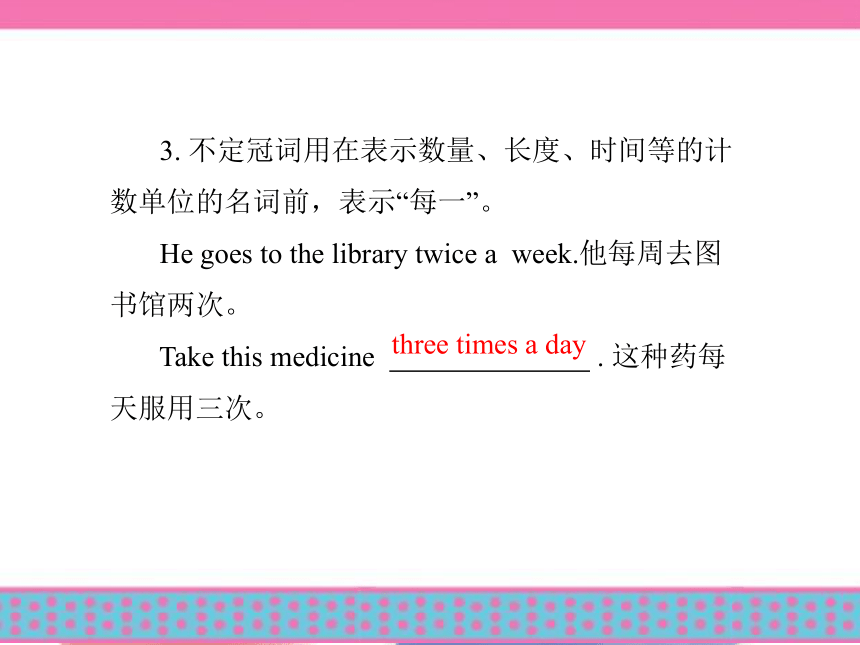
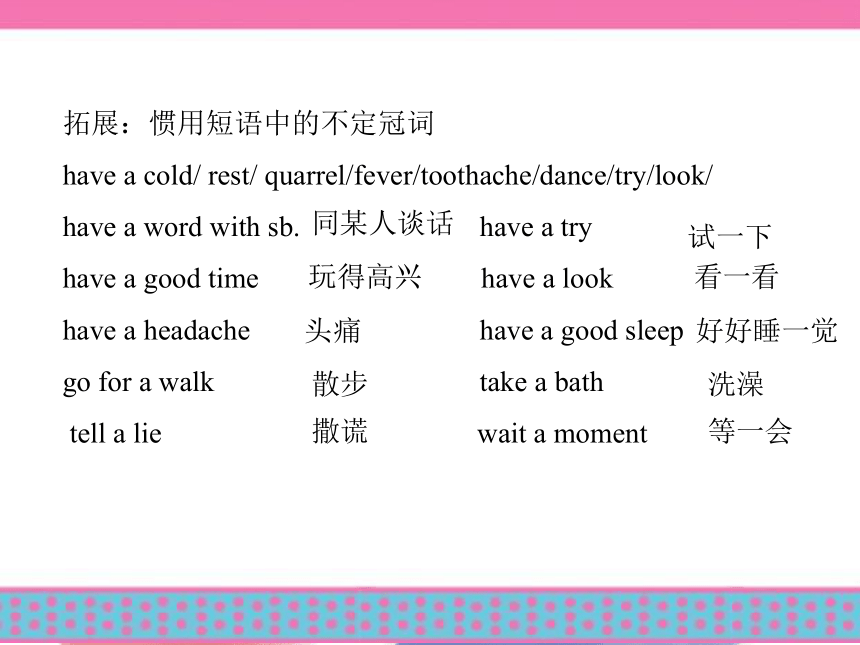
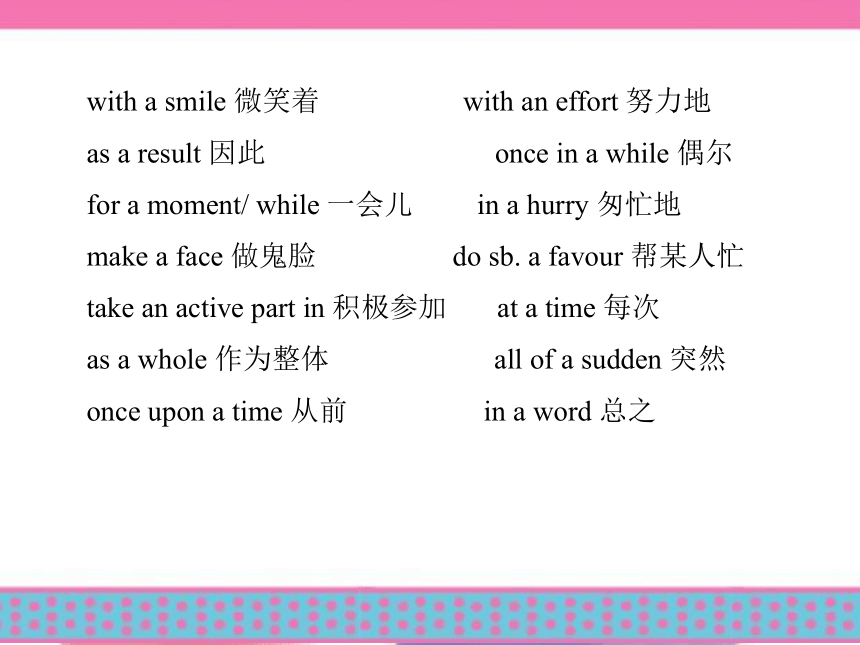
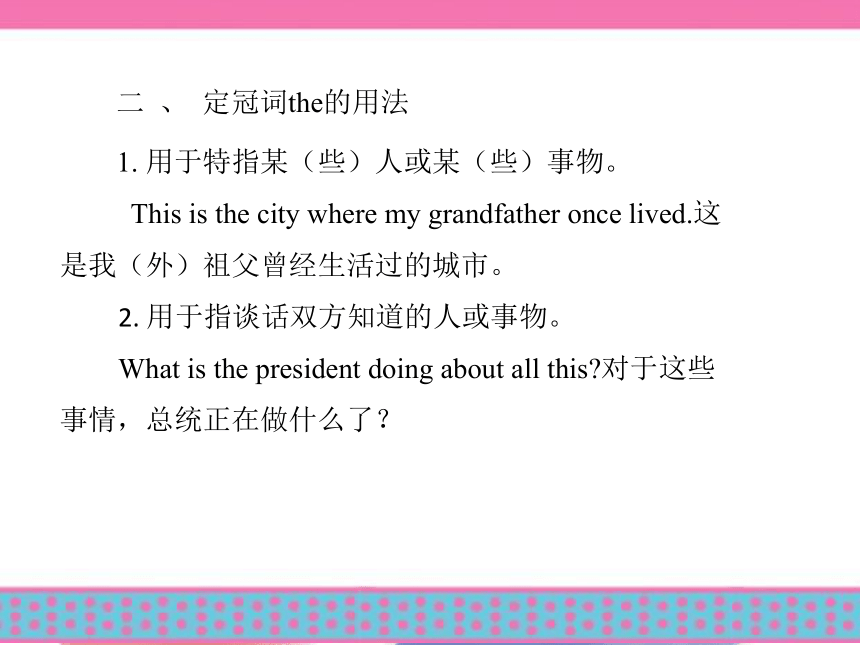
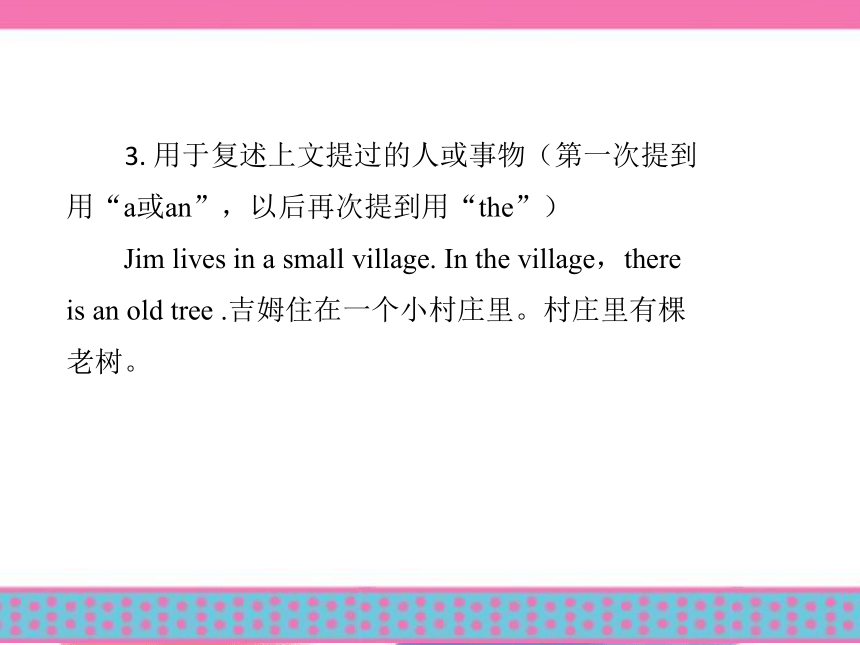
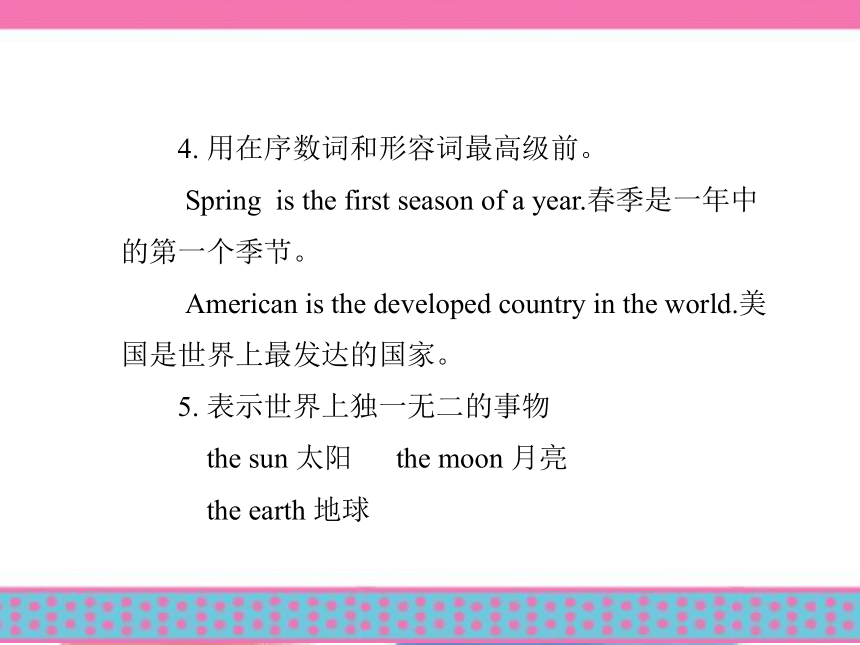
文档简介
课件32张PPT。 英语湖南语法专题三 冠词中考名题体验1.(2016年益阳)It took me half hour to finish my homework last night.
A.a B.an C.the
2.(2016年永州)I find pen on the ground.Whose is pen?
A. a;the B. the;a C. a;a
3.(2016年淮安改编) Jack often plays _____ piano and he wants to be a pianist when he grows up.
A. a B. an C. the
BAC4.(2016年苏州改编)Edward and William are brothers. There is
uncommon similarity between two boys.
A.an; 不填 B.an; the
C.a; 不填
5.(2016年广东改编)Brazil, ______country in South America, will hold 31th Olympic Games in the August, 2016.
A. a; a B. a; the C. the; a
中考名题体验BB语法探究一、 不定冠词a、an的用法 1.a和an都用于可数名词单数前,泛指人和物。表示可数事物中的一个。
(1)若随后的单词以辅音音素开头,用 a。
如 a lot of 、 a good idea、 a pear。
(2)若随后的单词以元音音素开头,用 an。
如 an example、an orange、an apple。
注意:某些以元音字母开头的单词用a,因为其第一个音是 /j/。 如:a university、a European language 。
某些以字母 h 开头的单词用an,因为这些单词的“h”不发音。 如:an honest boy, an hour ago。 2.首次提及某人或某物时,一般用“a”或 “an”。
She is reading a book.
After years of hard work,he eventually bought a house. 3. 不定冠词用在表示数量、长度、时间等的计数单位的名词前,表示“每一”。
He goes to the library twice a week.他每周去图书馆两次。
Take this medicine . 这种药每天服用三次。
three times a day拓展:惯用短语中的不定冠词
have a cold/ rest/ quarrel/fever/toothache/dance/try/look/
have a word with sb. have a try
have a good time have a look
have a headache have a good sleep
go for a walk take a bath
tell a lie wait a moment
玩得高兴 看一看 头痛 好好睡一觉
散步 洗澡 撒谎 等一会同某人谈话试一下 with a smile 微笑着 with an effort 努力地
as a result 因此 once in a while 偶尔
for a moment/ while 一会儿 in a hurry 匆忙地
make a face 做鬼脸 do sb. a favour 帮某人忙
take an active part in 积极参加 at a time 每次 as a whole 作为整体 all of a sudden 突然 once upon a time 从前 in a word 总之二 、 定冠词the的用法 1. 用于特指某(些)人或某(些)事物。
This is the city where my grandfather once lived.这是我(外)祖父曾经生活过的城市。
2. 用于指谈话双方知道的人或事物。
What is the president doing about all this?对于这些事情,总统正在做什么了? 3. 用于复述上文提过的人或事物(第一次提到用“a或an”,以后再次提到用“the”)
Jim lives in a small village. In the village,there is an old tree .吉姆住在一个小村庄里。村庄里有棵老树。 4. 用在序数词和形容词最高级前。
Spring is the first season of a year.春季是一年中的第一个季节。
American is the developed country in the world.美国是世界上最发达的国家。
5. 表示世界上独一无二的事物
the sun 太阳 the moon 月亮
the earth 地球 6. 用于由普通名词构成的专有名词前。
the Great Wall 长城 the United States 美国 the United Nations 联合国
7. 用于表示方向、方位 名词前
in the east 在东方 in the front 在前面
at the back 在后面 in the bottom 在底部 at the top 在顶部 on the right 在右边 8.用在表示计量的(度量衡)名词前 。
by the ton/pound/yard/metre/kilo
注意:by后面接上表示面积 体积 重量 长 高 短 深时 中间不加冠词 如
by volume/weight/length/width/depth 9. 在海洋、江河、湖泊、山脉、海峡、海湾等地理名词前
the Pacific Ocean 太平洋 the Huanghe River 黄河
the Tianshan Mountains 天山山脉 the Taiwan Straits 台湾海峡
10. 在姓氏复数前,表示一家人
The Whites are going to visit China next month.
怀特一家人下个月打算来中国。
11. 和某些形容词连用,表示一类人或物
the poor 穷人 the rich 富人
the sick 病人 the wounded 伤员
12. 在the more, the more比较级的句式中
The more you exercise,the more Health you are。
你锻炼的越多,就会越健康。
13. 用在西洋乐器单数可数名词前
play the piano 弹钢琴 play the violin 拉小提琴
*中国乐器名词前不与冠词连用:play erhu(二胡)
14. the用在可数名词单数前可以表示一类人或事物
The horse is a useful animal.
马是一种有用的动物。
15.在句型“动词+sb.+介词+the+身体某一部位”中要用?the,而不?用人称代词。
take sb. by the arm 抓住某人的手臂
hit sb. in the face 打某人的脸
16. 用在世纪或“世纪+年代”名词前
in the18th century 在18世纪
in the 1960s 在20世纪60年代
17. 用在某些固定的表达法
in the morning 在早上 in the afternoon 在下午
in the evening 在晚上 go to the cinema 去看电影
in the world 在世界上 all the year round 一年到头
on the way to 前往...去的路上 三、 不用冠词的情况(也称作零冠词)零冠词的用法
1. 专有名词前一般不加冠词
China 中国 Africa 非洲 Tu Youyou 屠呦呦
2. 季节、月份、星期、节日前一般不加冠词
January 一月份 Tuesday星期二 May Day 劳动节
Christmas Day 圣诞节 Thanksgiving 感恩节
注:民族节日前要加the 如:the Spring Festival3. 三餐前一般不加冠词
I have lunch at school.
我在学校吃午餐。
比较: I had a big lunch yesterday.
昨天我吃了一顿丰盛的午餐。(表示某一个)
The dinner given by Mr Smith was very nice.
史密斯先生款待的晚宴真是美味。(表示特指) 4. 球类运动的名词前
play basketball 打篮球 play volleyball 打排球
play football 踢足球
5. 没有特指的物质名词
This cart is made of wood.
这辆手推车是用木头作的。
比较: The wood outside was all wet.
外面的那些木头都湿了。(表示特指) 6. 没有特指的不可数抽象名词
Time is precious.
时间是宝贵的。
比较: The time of the play was 1990s.
这个剧本的时代背景是二十世纪九十年代。(表示特指)
7. 没有特指的可数名词复数形式
I like tomatoes.
我喜欢西红柿。
8. 山峰名字
Mount Qomolangma 珠穆朗玛峰
9. 独立结构中的名词不加冠词
A boy came in, book in hand.
一个男孩进来,手上拿着书。
10. 泛指人类
Man is mortal.
人必有一死。11. 职位、头衔的词前不用冠词,如king,captain,president,chairman 等。
He is (the) captain of the team.他是球队的队长。
As (the) chairman of the committee, I declare the meeting open.作为委员会主席,我宣布会议开始。12. 固定词组
go to school 去上学 go to bed 上床睡觉
go by train 乘火车去 go by boat 乘船去
at table 在用餐 in hospital 住院
at school 求学 in school 求学
at noon 在中午 at night 在晚上 at midnight 在半夜 in town 在城里
专项集训专项集训1.Tianjin is beautiful city in north of China.
A. a;a B. a;the C. the;/
2.— What did you do last night, Bob?
— First I did my homework, and then I played ______ piano for half ______ hour.
A.the; a B./;an C.the; an D.a; the
BC3. We work five days _________ week.
A. a B. an C. the
4. ____book on the desk is ____ useful one.
A. The; an B. A ; a
C. The ; a
5. We can't see ____ sun at ____ night.
A. a; / B. a; the
C. the; /
ACC6. After _______ supper, he stayed at home and played _______ piano.
A. the; the B. /; the C. /; a
7. I have two dogs.____ black one is two years old and ____ yellow one is three years old.
A. A; a B. The; a C. The; the
BC 8. I've tried it three times. Let me try ______ fourth time.
A. a B. an C. the
9. In the word "poridge" ____ "r" is lost.
A. the B. an C. a
10. English is ____ useful language in ___ world.
A. an; the B. a; the C. the; the
11. new bridge has been built over Huangpu River.
A. The; a B. A; / C. A; the CABC12. —Mom, I hope to have__________ younger brother?
—Hmm!
A. an B. the C. a
13.—Kate, are you only child in your family?
—Yes, but new baby is on the way.
A. a; the B. an; the C. the; a CC
A.a B.an C.the
2.(2016年永州)I find pen on the ground.Whose is pen?
A. a;the B. the;a C. a;a
3.(2016年淮安改编) Jack often plays _____ piano and he wants to be a pianist when he grows up.
A. a B. an C. the
BAC4.(2016年苏州改编)Edward and William are brothers. There is
uncommon similarity between two boys.
A.an; 不填 B.an; the
C.a; 不填
5.(2016年广东改编)Brazil, ______country in South America, will hold 31th Olympic Games in the August, 2016.
A. a; a B. a; the C. the; a
中考名题体验BB语法探究一、 不定冠词a、an的用法 1.a和an都用于可数名词单数前,泛指人和物。表示可数事物中的一个。
(1)若随后的单词以辅音音素开头,用 a。
如 a lot of 、 a good idea、 a pear。
(2)若随后的单词以元音音素开头,用 an。
如 an example、an orange、an apple。
注意:某些以元音字母开头的单词用a,因为其第一个音是 /j/。 如:a university、a European language 。
某些以字母 h 开头的单词用an,因为这些单词的“h”不发音。 如:an honest boy, an hour ago。 2.首次提及某人或某物时,一般用“a”或 “an”。
She is reading a book.
After years of hard work,he eventually bought a house. 3. 不定冠词用在表示数量、长度、时间等的计数单位的名词前,表示“每一”。
He goes to the library twice a week.他每周去图书馆两次。
Take this medicine . 这种药每天服用三次。
three times a day拓展:惯用短语中的不定冠词
have a cold/ rest/ quarrel/fever/toothache/dance/try/look/
have a word with sb. have a try
have a good time have a look
have a headache have a good sleep
go for a walk take a bath
tell a lie wait a moment
玩得高兴 看一看 头痛 好好睡一觉
散步 洗澡 撒谎 等一会同某人谈话试一下 with a smile 微笑着 with an effort 努力地
as a result 因此 once in a while 偶尔
for a moment/ while 一会儿 in a hurry 匆忙地
make a face 做鬼脸 do sb. a favour 帮某人忙
take an active part in 积极参加 at a time 每次 as a whole 作为整体 all of a sudden 突然 once upon a time 从前 in a word 总之二 、 定冠词the的用法 1. 用于特指某(些)人或某(些)事物。
This is the city where my grandfather once lived.这是我(外)祖父曾经生活过的城市。
2. 用于指谈话双方知道的人或事物。
What is the president doing about all this?对于这些事情,总统正在做什么了? 3. 用于复述上文提过的人或事物(第一次提到用“a或an”,以后再次提到用“the”)
Jim lives in a small village. In the village,there is an old tree .吉姆住在一个小村庄里。村庄里有棵老树。 4. 用在序数词和形容词最高级前。
Spring is the first season of a year.春季是一年中的第一个季节。
American is the developed country in the world.美国是世界上最发达的国家。
5. 表示世界上独一无二的事物
the sun 太阳 the moon 月亮
the earth 地球 6. 用于由普通名词构成的专有名词前。
the Great Wall 长城 the United States 美国 the United Nations 联合国
7. 用于表示方向、方位 名词前
in the east 在东方 in the front 在前面
at the back 在后面 in the bottom 在底部 at the top 在顶部 on the right 在右边 8.用在表示计量的(度量衡)名词前 。
by the ton/pound/yard/metre/kilo
注意:by后面接上表示面积 体积 重量 长 高 短 深时 中间不加冠词 如
by volume/weight/length/width/depth 9. 在海洋、江河、湖泊、山脉、海峡、海湾等地理名词前
the Pacific Ocean 太平洋 the Huanghe River 黄河
the Tianshan Mountains 天山山脉 the Taiwan Straits 台湾海峡
10. 在姓氏复数前,表示一家人
The Whites are going to visit China next month.
怀特一家人下个月打算来中国。
11. 和某些形容词连用,表示一类人或物
the poor 穷人 the rich 富人
the sick 病人 the wounded 伤员
12. 在the more, the more比较级的句式中
The more you exercise,the more Health you are。
你锻炼的越多,就会越健康。
13. 用在西洋乐器单数可数名词前
play the piano 弹钢琴 play the violin 拉小提琴
*中国乐器名词前不与冠词连用:play erhu(二胡)
14. the用在可数名词单数前可以表示一类人或事物
The horse is a useful animal.
马是一种有用的动物。
15.在句型“动词+sb.+介词+the+身体某一部位”中要用?the,而不?用人称代词。
take sb. by the arm 抓住某人的手臂
hit sb. in the face 打某人的脸
16. 用在世纪或“世纪+年代”名词前
in the18th century 在18世纪
in the 1960s 在20世纪60年代
17. 用在某些固定的表达法
in the morning 在早上 in the afternoon 在下午
in the evening 在晚上 go to the cinema 去看电影
in the world 在世界上 all the year round 一年到头
on the way to 前往...去的路上 三、 不用冠词的情况(也称作零冠词)零冠词的用法
1. 专有名词前一般不加冠词
China 中国 Africa 非洲 Tu Youyou 屠呦呦
2. 季节、月份、星期、节日前一般不加冠词
January 一月份 Tuesday星期二 May Day 劳动节
Christmas Day 圣诞节 Thanksgiving 感恩节
注:民族节日前要加the 如:the Spring Festival3. 三餐前一般不加冠词
I have lunch at school.
我在学校吃午餐。
比较: I had a big lunch yesterday.
昨天我吃了一顿丰盛的午餐。(表示某一个)
The dinner given by Mr Smith was very nice.
史密斯先生款待的晚宴真是美味。(表示特指) 4. 球类运动的名词前
play basketball 打篮球 play volleyball 打排球
play football 踢足球
5. 没有特指的物质名词
This cart is made of wood.
这辆手推车是用木头作的。
比较: The wood outside was all wet.
外面的那些木头都湿了。(表示特指) 6. 没有特指的不可数抽象名词
Time is precious.
时间是宝贵的。
比较: The time of the play was 1990s.
这个剧本的时代背景是二十世纪九十年代。(表示特指)
7. 没有特指的可数名词复数形式
I like tomatoes.
我喜欢西红柿。
8. 山峰名字
Mount Qomolangma 珠穆朗玛峰
9. 独立结构中的名词不加冠词
A boy came in, book in hand.
一个男孩进来,手上拿着书。
10. 泛指人类
Man is mortal.
人必有一死。11. 职位、头衔的词前不用冠词,如king,captain,president,chairman 等。
He is (the) captain of the team.他是球队的队长。
As (the) chairman of the committee, I declare the meeting open.作为委员会主席,我宣布会议开始。12. 固定词组
go to school 去上学 go to bed 上床睡觉
go by train 乘火车去 go by boat 乘船去
at table 在用餐 in hospital 住院
at school 求学 in school 求学
at noon 在中午 at night 在晚上 at midnight 在半夜 in town 在城里
专项集训专项集训1.Tianjin is beautiful city in north of China.
A. a;a B. a;the C. the;/
2.— What did you do last night, Bob?
— First I did my homework, and then I played ______ piano for half ______ hour.
A.the; a B./;an C.the; an D.a; the
BC3. We work five days _________ week.
A. a B. an C. the
4. ____book on the desk is ____ useful one.
A. The; an B. A ; a
C. The ; a
5. We can't see ____ sun at ____ night.
A. a; / B. a; the
C. the; /
ACC6. After _______ supper, he stayed at home and played _______ piano.
A. the; the B. /; the C. /; a
7. I have two dogs.____ black one is two years old and ____ yellow one is three years old.
A. A; a B. The; a C. The; the
BC 8. I've tried it three times. Let me try ______ fourth time.
A. a B. an C. the
9. In the word "poridge" ____ "r" is lost.
A. the B. an C. a
10. English is ____ useful language in ___ world.
A. an; the B. a; the C. the; the
11. new bridge has been built over Huangpu River.
A. The; a B. A; / C. A; the CABC12. —Mom, I hope to have__________ younger brother?
—Hmm!
A. an B. the C. a
13.—Kate, are you only child in your family?
—Yes, but new baby is on the way.
A. a; the B. an; the C. the; a CC
同课章节目录
- 词法
- 名词
- 动词和动词短语
- 动词语态
- 动词时态
- 助动词和情态动词
- 非谓语动词
- 冠词
- 代词
- 数词和量词
- 形容词副词及其比较等级
- 介词和介词短语
- 连词和感叹词
- 构词法
- 相似、相近词比较
- 句法
- 陈述句
- 一般疑问句和否定疑问句
- 特殊疑问句及选择疑问句
- 反意疑问句
- 存在句(There be句型)
- 宾语从句
- 定语从句
- 状语从句
- 主谓一致问题
- 简单句
- 并列句
- 复合句
- 主谓一致
- 主、表语从句
- 名词性从句
- 直接引语和间接引语
- 虚拟语气
- 感叹句
- 强调句
- 倒装句
- 祈使句
- 句子的成分
- 句子的分类
- 题型专区
- 单项选择部分
- 易错题
- 完形填空
- 阅读理解
- 词汇练习
- 听说训练
- 句型转换
- 补全对话
- 短文改错
- 翻译
- 书面表达
- 任务型阅读
- 语法填空
- 其他资料
